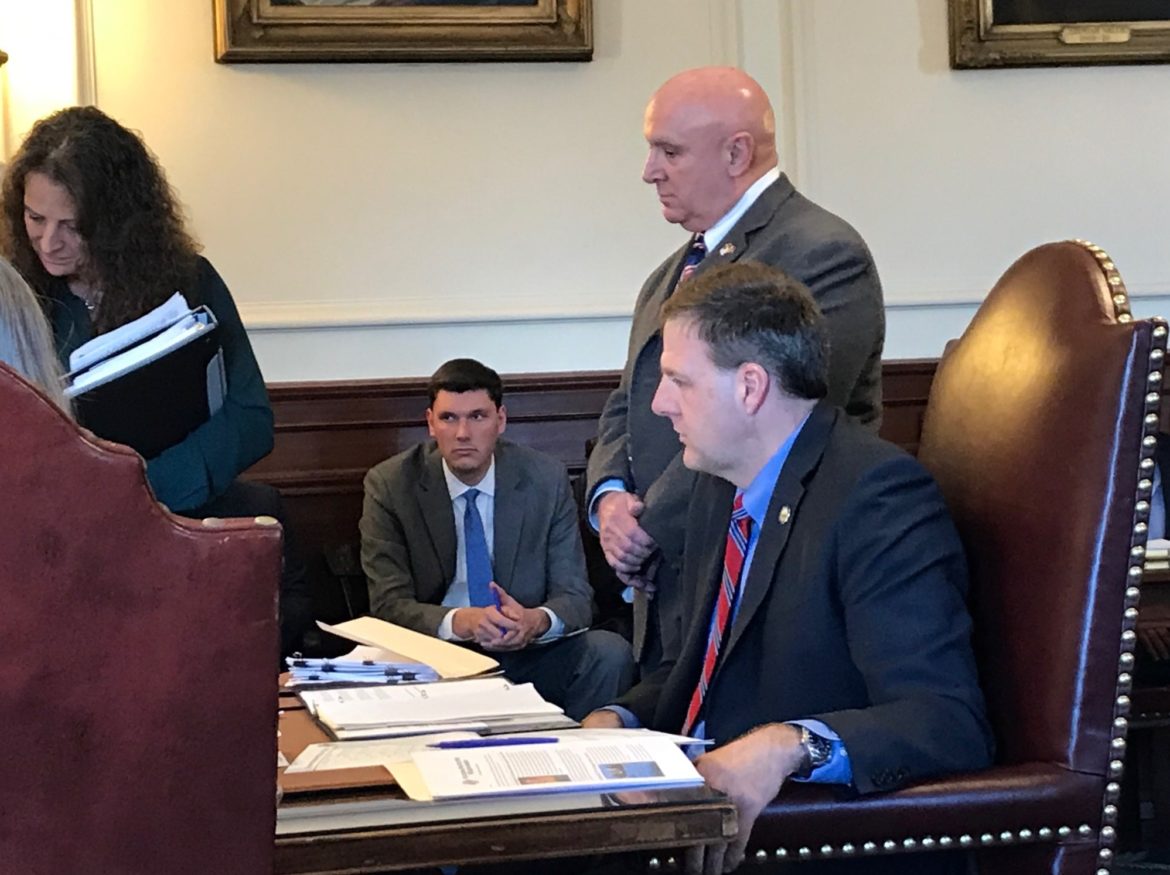By GARRY RAYNO, InDepthNH.org
CONCORD — Top management of the New Hampshire Liquor Commission will forego proposed raises until the end of the year after the Executive Council failed to act on their requests Wednesday.
At the council’s meeting, councilors voted 3-2 to table four proposed raises for the top four Liquor Commission positions, including commissioner and deputy commissioner, until audited financials are available, likely not until December when the state’s finances are audited.
District 2 Executive Councilor Andru Volinsky, D-Concord, questioned Liquor Commissioner Joseph Mollica and Christina M. Demers, Chief Financial Officer, about the agency’s operations, schedule for a new software deployment, a proposed mail order business and its profits.
He and several other councilors asked for Wednesday’s meeting two weeks ago when the council tabled the agency’s management raises while other state agency managers received salary increases included in the state’s new collective bargaining agreement with employees.
After the meeting, Volinsky said it is the council’s and governor’s responsibility to oversee agencies like liquor and lottery that produce revenue for the state.
He noted the agency has promised to establish a mail order business and to have new software in place by now but has failed to meet their own timeframes.
Flat profits
Volinsky also said the agency’s net profits have been flat for the past several years and has failed to meet revenue projections set in the state’s biennial budget.
Mollica told the council the new software would be in place in a year and the commission is waiting for a U.S. Supreme Court ruling on interstate mail-order sales. He said wine could only be shipped into 10 states at this time and only in small quantities. Mollica said he hopes the court opens up the process for everyone.
He blamed competition from private liquor retailer Total Wine for revenue shortfalls and said the bottom line would have been far worse if the commission had not invested in new stores and renovations in key existing outlets.
“If we ran (the commission) the way it was run before (Total Wine) we would be down $100 million,” Mollica said. The agency’s capital investments were just 1.9 percent of profits, not 40 to 50 percent that start-ups have to do.
“I understand it’s on my shoulders. I knew liquor revenues would be flat for a number of years while we make these investments,” Mollica said, “but those numbers start to go in another direction in 2021.”
Total Wine and More is a Maryland-based, privately-held company with 193 stores nationwide and more than $3 billion in retail sales. The company entered the Massachusetts market after a 2011 law change and currently has six locations in the Bay State.
Mollica said the company uses “bait and switch” tactics and tries to move customers to their own private brands.
“We knew this was coming so we changed (state) law in 2011 to allow us to get ahead of this,” he said.
Mollica noted since Total Wine moved next door, the percentage of the commission’s business from Massachusetts customers dropped from 21 to 16 percent.
He said that 40 to 50 percent of the agency’s business is from out-of-state customers.
For the past few fiscal years, the Liquor Commission has failed to meet its revenue projections, which under state law, requires that the commission’s budget be reduced.
Expenses increase
Volinsky said while retail sales have increased significantly, so have agency expenses making net profits flat or on a downward trend.
He said the commission’s explanation is that the legislature increased the revenue estimates over what the agency believed it would produce.
He asked Mollica if he was saying the legislature inflated the numbers.
Demers said the agency makes its projections based on three-year trends, but the trend changed while the biennial budget was in place and no adjustments were made to the revenue estimates.
Volinsky asked to have the four raises tabled until there is an audit of the agency’s financials, a schedule to implement the new financial software, and a solid mail-order plan.
Along with Mollica, the raises were for Deputy Commissioner Michael Milligan, Enforcement Division Director Mark Armaganian, and Marketing Division Director Nicole Brassard-Jordan.
Mollica’s salary is $118,708 and would increase with the raise to $124,580; Milligan’s would go from $112,255 to $117,805. And Armaganian’s and Brassard-Jordan’s both would have gone from $103,059 to $108,149.
District 3 Executive Councilor Russell Prescott, R-Kingston, opposed the motion. “I find this a little bit indignant,” he said, “two weeks ago we did not require this kind of information.”
He said he does not believe it was proper to withhold raises for six months to wait for an audit and called the motion unreasonable.
Prescott and District 4 Councilor Ted Gatsas, R-Manchester, voted against the motion, while Volinsky, District 5 Councilor Debora Pignatelli, D-Nashua, and District 1 Councilor Michael Cryans, D-Hanover, vote to table the raises.
Garry Rayno may be reached at garry.rayno@yahoo.com.





